Podcast Topic: Social Safety Net & Food
Podcast Topic: Social Safety Net & Food
 E187: FDA role in national strategy to end hunger
E187: FDA role in national strategy to end hunger
November 14, 2022
In September of 2022, the White House held the first conference focused on hunger, nutrition, and health, in 50 years. The convening served as the Biden-Harris administration’s call-to-action to end hunger, and increase healthy eating, and the physical activity among Americans, by the year 2030. But how successful was this event in actually catalyzing a national strategy? We’ll hear perspectives on this from Dr. Susan Mayne, Director of the Center for Food Safety and Applied Nutrition at the Food and Drug Administration.
Related podcasts: Diet & Nutrition | Equity, Race & Food Justice | Food Insecurity | Food Policy | Social Safety Net & Food |
 E168: Nutrition Security now a Clear Focus for USDA
E168: Nutrition Security now a Clear Focus for USDA
May 26, 2022
Poor nutrition is the leading cause of health issues in the United States, with nearly three in four American adults being overweight or obese, and obesity in children and young people being equally concerning. Today, we’re talking with Dr. Sara Bleich, the new Director of Nutrition Security and Health Equity at the Food and Nutrition Service at the US Department of Agriculture. Dr. Bleich is leading the department’s overall effort to tackle food and nutrition insecurity in the United States.
Related podcasts: Equity, Race & Food Justice | Food Insecurity | Food Policy | Social Safety Net & Food |
 E154: Micropantries and Community Resilience during the COVID-19 Pandemic
E154: Micropantries and Community Resilience during the COVID-19 Pandemic
January 21, 2022
Today, we’re going to speak about micropantries as a form of community resilience in the face of the food insecurity exacerbated by the COVID-19 pandemic. Our guests today are Reverend Wendy Miller Olapade of the United Church of Christ in Medford, Massachusetts, professor Norbert Wilson, who’s Professor of Food Economics and Community at Duke University, and lead author of a recent paper on micropantries in the Journal of Nutrition Education and Behavior, Sara Folta, with the Tufts Friedman School of Nutrition, Science, and Policy.
Related podcasts: Community & Economic Development | COVID-19 Pandemic Impacts on Food | Faith & Food | Food Insecurity | Social Safety Net & Food |
 E145: A Strategy to Improve SNAP Impact Through the Next Farm Bill
E145: A Strategy to Improve SNAP Impact Through the Next Farm Bill
October 12, 2021
In 2023, the U.S. will reauthorize the Supplemental Nutrition Assistance Program, known as SNAP, as part of the massive Farm Bill. In the aftermath of the COVID-19 lockdowns and unprecedented innovations to SNAP benefits and delivery, what should the future program look like? As one of the country’s most important social safety nets, SNAP is a proven policy for stabilizing the economy, lifting Americans out of poverty, reducing food insecurity, and improving health while also reducing healthcare costs. In anticipation of this reauthorization, the Robert Wood Johnson Foundation’s Healthy Eating Research Program published a new report entitled “Strengthening the Public Health Impacts of SNAP: Key Opportunities for the Next Farm Bill.” The report identified the evidence-based changes that have the greatest potential to improve SNAP participants’ nutrition and their overall health. And the stakes on this are really high because the lives of so many people are affected. Today, we’ll be talking with Duke University’s Megan Lott, deputy director of the Robert Wood Johnson Foundation’s Healthy Eating Research Program, and coauthor Catherine Woteki, former under secretary for the USDA’s Research, Education, and Economics mission areas, who is now on the faculty of Iowa State University and at the University of Virginia, and she’s also the president of the Charles Valentine Riley Memorial Foundation.
Related podcasts: Advocacy & Food | Child Development & Nutrition | COVID-19 Pandemic Impacts on Food | Equity, Race & Food Justice | Food Insecurity | Food Policy | Social Safety Net & Food |
 E143: Improved Child Tax Credit Will Lift Many Out of Poverty
E143: Improved Child Tax Credit Will Lift Many Out of Poverty
September 28, 2021
As many as 13 million children in the United States live in food insecure homes, meaning that these households don’t have enough food for every family member to lead a healthy life. Hunger is a problem that most often affects children from low-income families. And today we’re going to discuss the Child Tax Credit aimed at helping low-income families and the historic increases in the credit made through the American Rescue Plan in 2021. Our guest today is Billy Shore, the founder and executive chair of Share Our Strength, a nonprofit working to solve problems of hunger and poverty, both in the United States and around the world. Share Our Strength is also the parent organization for the well-known No Kid Hungry campaign, the national policy, advocacy, outreach, and research effort to improve childhood nutrition, support school meals, and provide resources to schools, food banks, and community groups working to end hunger.
Related podcasts: COVID-19 Pandemic Impacts on Food | Food Insecurity | Food Policy | Social Safety Net & Food |
 E136: When North Carolina Schools Offer Free Meals Academic Success Follows
E136: When North Carolina Schools Offer Free Meals Academic Success Follows
August 19, 2021
For youngsters in school, nutritional meals really do lead the higher grades and better performance across the board. Today we’ll explore a policy called the Community Eligibility Provision or CEP that allows schools in low-income areas to offer free meals to all students. We have two guests today. Marianne Hedrick Weant, Programs Manager at the North Carolina Alliance for Health and Dr. Sarah Crittenden Fuller, Research Associate Professor at The University of North Carolina and a proud Duke alum from our own program. She’s also the coauthor of a new policy brief on this topic, entitled Meals Matter, The Community Eligibility Provision and Students’ Success in North Carolina.
Related podcasts: Child Development & Nutrition | Childhood Obesity | Diet & Nutrition | Food Insecurity | Food Policy | North Carolina | School Meals | Social Safety Net & Food |
 E135: How did SNAP do during COVID and What Changes Need to Stay?
E135: How did SNAP do during COVID and What Changes Need to Stay?
July 20, 2021
The COVID-19 pandemic changed our lives and led to mandated business and school closures, families and communities all around the country experienced record levels of unemployment and record levels of food insecurity. This led to unprecedented policy innovation designed to increase access to nutritious food through the supplemental nutrition assistance program, known as SNAP. The program that was formerly known as Food Stamps. In today’s podcast, we’ll talk with the authors of a new report entitled, Supplemental Nutrition Assistance Program Waivers and Adaptations During the COVID-19 Pandemic, A Survey of State Agency Perspectives in 2020.
Related podcasts: COVID-19 Pandemic Impacts on Food | Food Insecurity | Food Policy | Social Safety Net & Food |
 E130: Can Software Help Cities Solve Food Insecurity?
E130: Can Software Help Cities Solve Food Insecurity?
May 27, 2021
Can software help urban planners tackle food access in big cities? The UrbanFootprint organization says yes. Fast Company named it one of the most innovative social good companies in 2021. Our guest today is the company’s co-founder and CEO, Joe DiStefano. He’s going to explain how city data and geospatial information can inform critical planning decisions about where to invest and to deploy resources to achieve urban food system resilience and to better support communities.
Related podcasts: Community & Economic Development | Diet & Nutrition | Equity, Race & Food Justice | Food Insecurity | Social Safety Net & Food |
 E113: The Power of Policy and Parents in School Meals
E113: The Power of Policy and Parents in School Meals
February 11, 2021
It wasn’t that long ago that there was a nutrition free-for-all in schools where sugary beverages, high calorie snack foods, and even things like pizzas and cheeseburgers direct from fast food chains were part of the food landscape in schools. What do you think the situation is today? Has it deteriorated even further? Has it improved or stayed about the same? Today’s guest, Dr. Marlene Schwartz, is a champion for improved nutrition and physical activity in schools and one of the leading experts in the field. Schwartz is director of the Rudd Center for Food Policy and Obesity and Professor of Human Development and Family Studies at the University of Connecticut. She’s an expert on nutrition and physical activity policies in schools and preschools nationwide, and has collaborated in particular with the Connecticut Department of Education on their policies.
Related podcasts: Child Development & Nutrition | Childhood Obesity | Children Food Preferences | Diet & Nutrition | Food Insecurity | Food Policy | School Meals | Social Safety Net & Food |
 E112: Food Banks, Food Pantries, and the Promise of More
E112: Food Banks, Food Pantries, and the Promise of More
February 9, 2021
Food banks and food pantries provide life-saving help for families all around the country. Like other institutions addressing food issues, there is growing focus on providing not just food, but healthy food. There are complex issues in this picture, however, issues we can address with today’s guest, Dr. Marlene Schwartz. Schwartz is director of the Rudd Center for Food Policy and Obesity and Professor of Human Development and Family Studies at the University of Connecticut.
Related podcasts: Food Banks, Food Pantries & Soup Kitchens | Food Insecurity | Food Policy | Philanthropy & Food Systems | Social Safety Net & Food |

 E187: FDA role in national strategy to end hunger
E187: FDA role in national strategy to end hunger E168: Nutrition Security now a Clear Focus for USDA
E168: Nutrition Security now a Clear Focus for USDA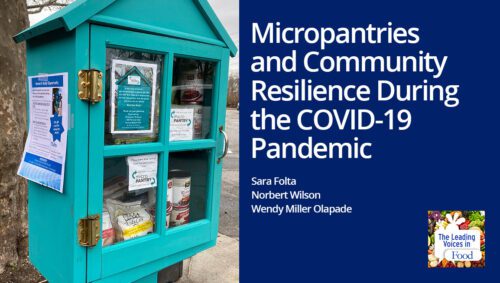 E154: Micropantries and Community Resilience during the COVID-19 Pandemic
E154: Micropantries and Community Resilience during the COVID-19 Pandemic E145: A Strategy to Improve SNAP Impact Through the Next Farm Bill
E145: A Strategy to Improve SNAP Impact Through the Next Farm Bill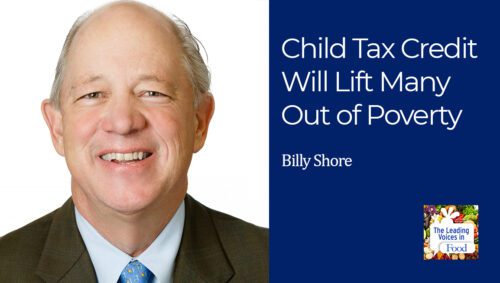 E143: Improved Child Tax Credit Will Lift Many Out of Poverty
E143: Improved Child Tax Credit Will Lift Many Out of Poverty E136: When North Carolina Schools Offer Free Meals Academic Success Follows
E136: When North Carolina Schools Offer Free Meals Academic Success Follows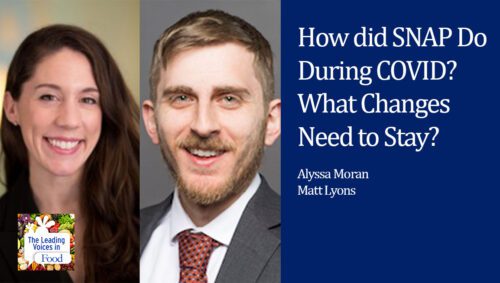 E135: How did SNAP do during COVID and What Changes Need to Stay?
E135: How did SNAP do during COVID and What Changes Need to Stay?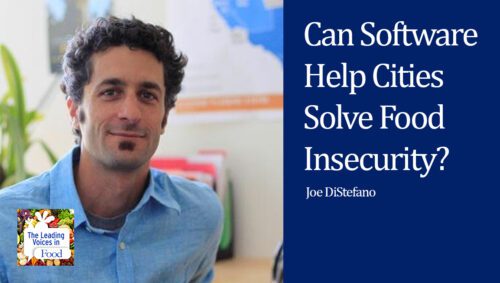 E130: Can Software Help Cities Solve Food Insecurity?
E130: Can Software Help Cities Solve Food Insecurity? E113: The Power of Policy and Parents in School Meals
E113: The Power of Policy and Parents in School Meals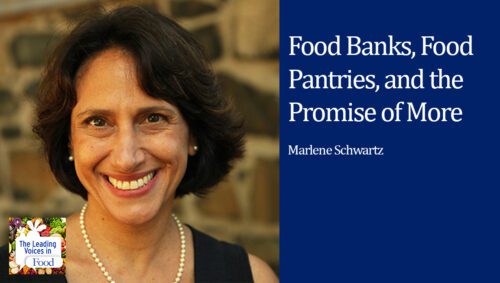 E112: Food Banks, Food Pantries, and the Promise of More
E112: Food Banks, Food Pantries, and the Promise of More